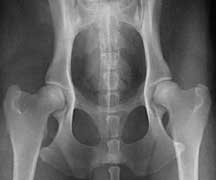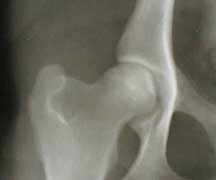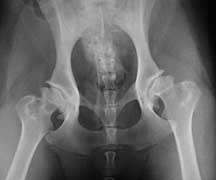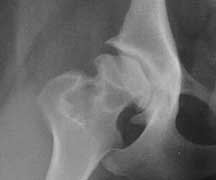|
Hip dysplasia is the most common cause of rear leg lameness in dogs. The highest incidence occurs in large-breed dogs, including Saint Bernards, Newfoundlands, Rottweilers, Chesapeake Bay Retrievers, Golden Retrievers, German Shepherd Dogs and many others.
Smaller breeds are also affected, but are less likely to show symptoms. According to statistics compiled by the Orthopedic Foundation for Animals, the risk of hip dysplasia in many of the large-breed dogs presented to them for certification over the last 25 years ranged from 20 to 40 percent.
Hip dysplasia is a polygenic trait. That is, more than one gene controls the inheritance. The hip is a ball-and-socket joint; the ball is the head of the femur and the socket is the acetabulum of the pelvis. In a dysplastic hip, the head of the femur fits loosely into a poorly developed, shallow acetabulum. Joint instability occurs as muscle development lags behind the rate of skeletal growth. As the stress of weight bearing exceeds the strength limits of the supporting connective tissue and muscle, the joint becomes loose and unstable. This allows for free play of the femoral head in the acetabulum, which promotes abnormal wear and tear.
Prevention:
Preventing excessive weight gain in puppy hood and keeping the puppy from placing undue stress on the hips will delay the onset of hip dysplasia in many dogs with a genetic predisposition. It may also lead to a less severe form of the disease. Puppies at risk for hip dysplasia should be fed a calorie-controlled diet.
Preventing hip dysplasia in a bloodline is based on selective breeding practices. Hip dysplasia is a moderately heritable condition. It is twice as common among littermates having one dysplastic parent. Experience shows that repeated selection of normal dogs for breeding stock significantly reduces the incidence of hip dysplasia in susceptible bloodlines.
Information on breed risk is available through the OFA and PennHip. In breeds where hip dysplasia is a particular problem, prospective puppy buyers are advised to check pedigrees for OFA, PennHip or GDC certifications, particularly for sires and dams. Dogs, and domesticated animals in general, tend to have more genetic disorders than wild animals. This has to do with the mode of inheritance of diseased genes, which may be a bit complicated to understand unless you have studied genetics, or a medical professional with a doctorate of nursing practice or some other type of nursing degree.
VetGen is working toward the development of new DNA Tests for inherited diseases in many breeds of dog. Participation in VetGen's research is completely free and confidential. Samples are conveniently collected using our oral cheek swab kits. Current major research projects include:
Early-onset (or Juvenile) cataract
VetGen is interested in collecting samples from families of dogs in which two or more are affected.
Progressive Retinal Atrophy
We are interested in collecting samples from a few affected dogs.
Canine Hip Dysplasia
We are interested in collecting samples from families of dogs in which two or more are affected.
Inherited Epilepsy
We are interested in collecting samples from families of dogs in which two or more are affected.
von Willebrand's Disease (vWD)
VetGen is interested in collecting samples from dogs that have had a low result on the vonWillebrand's factor assay test, or dogs that have had a history of bleeding thought to be due to vWD. To date vWD testing is available through VetGen for the Doberman Pinscher, Scottish Terrier, Poodle, Manchester Terrier, Shetland Sheepdog, Pembroke Welsh Corgi and Bernese Mountain Dog.
Breeds |
Early Onset (or Juvenile) Cataract |
Progressive Retinal Atrophy |
Canine Hip Dysplasia |
Inherited Epilepsy |
von Willebrand's Disease |
| Airedale Terrier
|
|
|
families
|
|
|
| Alaskan Malamute
|
|
|
families
|
|
|
| All not listed in description
|
|
|
|
|
low vWF/bleeders
|
| American Cocker Spaniel
|
families
|
affecteds
|
|
|
|
| Australian Shepherd
|
|
|
|
families
|
|
| Beagle
|
|
|
|
families
|
|
| Bernese Mountain Dog
|
|
|
families
|
|
|
| Boston Terriers
|
families
|
|
|
|
|
| Bullmastiff
|
|
|
families
|
|
|
| Collie
|
|
|
|
families
|
|
| Dalmatian
|
|
|
|
families
|
|
| English Springer Spaniel
|
|
|
|
families
|
|
| German Shepherd
|
families
|
|
families
|
|
|
| Golden Retriever
|
families
|
|
families
|
|
|
| Irish Setter
|
|
|
|
families
|
|
| Labrador Retriever
|
families
|
affecteds
|
families
|
|
|
| Miniature Schnauzer
|
families
|
|
|
|
|
| Newfoundland
|
|
|
families
|
|
|
| Old English Sheepdog
|
|
|
families
|
|
|
| Poodle
|
families
|
affecteds
|
|
|
|
| Portuguese Water Dog
|
|
affecteds
|
families
|
|
|
| Rottweiler
|
|
|
families
|
|
|
| Samoyed
|
|
|
families
|
|
|
Please keep in mind that VetGen is currently collecting samples from these breeds. In the future and as research develops, we will expand the number of breeds in which we collect samples.
References:
Nzymes.com
Vetgen.com
|





